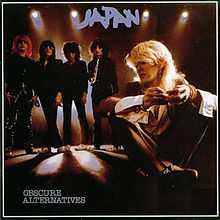Obscure Alternatives
| Obscure Alternatives | ||||
|---|---|---|---|---|
 | ||||
| Studio album by Japan | ||||
| Released | October 1978 | |||
| Recorded | 1978 | |||
| Genre | New wave, art rock, art pop | |||
| Length | 41:23 | |||
| Label | Hansa Records | |||
| Producer | Ray Singer | |||
| Japan chronology | ||||
| ||||
| Professional ratings | |
|---|---|
| Review scores | |
| Source | Rating |
| Allmusic | |
Obscure Alternatives is the second album by the English band Japan, released in October 1978.
History
Obscure Alternatives was released only seven months after the band's début album Adolescent Sex. The first album had been unsuccessful on the British charts, and their record company required another album, this time aimed at the lucrative US and European markets where rock was dominating the airwaves. Still working with Ray Singer as producer, singer/songwriter David Sylvian in particular found it difficult to take a back seat and began to demand more control over the eventual presentation of the material. The crucial track concerned was "The Tenant", a very important piece for Japan as it changed their direction and pointed the way ahead as far as Sylvian's solo career. "The Tenant" also marks bassist Mick Karn's recording debut on saxophone.
The tracks "Deviation" and "Sometimes I feel So Low" were released as singles in certain countries, the latter as a double A-side with a re-recorded version of "Adolescent Sex" (the title track of their first album, re-recorded during the sessions for this album). It became Japan's first European hit single, and the re-recorded version of 'Adolescent Sex" is featured on the 1981 compilation album Assemblage. Both tracks were mixed together to form "I Can't Wait", which was club hit for L'il Devious in 2003.[2]
Sylvian has gone on record saying that Obscure Alternatives should have been their debut album . The final track, "The Tenant", a piano based instrumental, was the first notable shift towards the direction their later material would take. As with the first album, Obscure Alternatives was commercially unsuccessful in the UK, but garnered moderate success in Japan where it peaked just outside the Top 20.
The album was remastered and re-released in 2004, and included a video for "Sometimes I Feel So Low".
Critical reception
According to Allmusic's review, "Their second album to hit the shelves in 1978, Japan's sophomore effort, Obscure Alternatives, found the band dropping most of their debut's funk fringe in favor of guitar-oriented fuzz and quirk – scooping up the glitter left behind by all the scene's other nascent Siouxies and Adam Ants. Although the set isn't quite up to par with its predecessor, Obscure Alternatives is still a challenging listen. David Sylvian is snotty on "Automatic Gun" – a spit-shined punk shocker backed by bright pop guitar – and ironically playing into all the guises they eschewed. Both the wonderfully atmospheric and slightly menacing title track and "Love Is Infectious" put the band completely into discordant post-punk art house-dom, the latter including a twisted piano solo in the middle of the guitar crunch. "....Rhodesia," on the other hand, brought the funk back and infused it with a Caribbean essence. While there is no doubt that Obscure Alternatives paled in the shadow of Adolescent Sex, Japan had obviously, in their eyes, broken through to find their style, their groove. Still eons away musically from their more commercial Tin Drum heyday, the band were nevertheless cultivating a breathtaking crop of kernels."[3]
Track listing
All songs written by David Sylvian.
Side A:
- "Automatic Gun" – 4:07
- "…Rhodesia" – 6:48
- "Love is Infectious" – 4:10
- "Sometimes I Feel So Low" – 3:46
Side B
- "Obscure Alternatives" – 6:50
- "Deviation" – 3:23
- "Suburban Berlin" – 4:59
- "The Tenant" – 7:14
Bonus tracks 2004 remastered CD version
- "Deviation" (Live) – 3:20
- "Obscure Alternatives" (Live) – 6:05
- "In Vogue" (Live) – 6:12
- "Sometimes I Feel So Low" (Live) – 4:06
- Also includes the video for "Sometimes I Feel So Low."
Singles
- "Sometimes I Feel So Low"
- "Deviation"
Personnel
- Japan
- David Sylvian – vocals, guitar
- Mick Karn – bass, saxophone, vocals
- Steve Jansen – drums, percussion, vocals
- Richard Barbieri – synthesizer, keyboards
- Rob Dean – guitar, vocals
- Additional personnel
- Chris Tsangarides – engineer
References
- ↑ Hanson, Amy (2011). "Obscure Alternatives – Japan | AllMusic". allmusic.com. Retrieved 3 August 2011.
- ↑ Paul Rymer, liner notes, Obscure Alternatives, SONY BMG, 2006
- ↑ All Music review (Obscure Alternatives)
| ||||||||||||||||||||||
| ||||||||||||||||||||||||||||||||||||||||||||||||||||